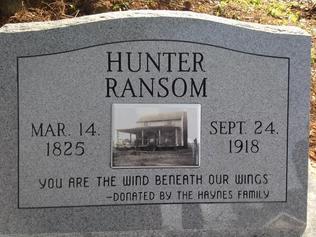

Descendants of former
slave will dedicate
monument at his gravesite in Mount Holly

A year before the first shots of the Civil War echoed, a Gaston County slave owner released Ransom Hunter from bondage and gave him a small parcel of land.
Hunter called his farm near the Catawba River Freedom. As his holdings grew during Reconstruction, he opened two livery stables, a general store and also sold off land for what became downtown Mount Holly.
Hunter sold parcels to other former slaves who’d been displaced in South Carolina and donated land for a school and church in what’s still known as the Freedom neighborhood. That’s where Hunter was buried when he died in 1918 at age 93.
This July 4 weekend, Hunter’s descendants are coming together for their first family reunion in 30 years. On Sunday, they’ll gather in the neighborhood to dedicate a large marble monument to replace the crumbling stone at Hunter’s grave.
In Gaston history, Hunter’s name has been mentioned only in passing.
Recent research by Hunter’s great-grandson, Eric Wilson of Greensboro, and historian Teresa Connor Greene of Mount Holly, has revealed his property holdings of about 80 acres. They believe Hunter is Gaston County’s first freed slave and also the county’s first to own property.
“He’s an inspiration to our family,” said Wilson, 55. “It was amazing how much he accomplished.”
To recognize Hunter’s achievements, the family is donating memorabilia to the Mount Holly Historical Museum. The information Wilson collected about his great-grandfather will be included in booklets that will be distributed at the family reunion.
The act of a slave owner granting freedom is called manumission. John David Smith, professor of history at UNC Charlotte, said historians have learned from court records that slave masters occasionally granted freed slaves land and sometimes farm animals.
He said Hunter’s example illustrates that “despite the failure of the U.S. government to award the freed people 40 acres and a mule following the Civil War, many African-Americans held land, some with substantial holdings, from Reconstruction onward.”
But Smith said the bigger point is that “blacks had a seemingly unquenchable thirst to own land and, after two centuries of chattel slavery, were determined to reap the fruits of their own labor.”
Crying for parents
A Mount Holly native, Wilson grew up listening to his grandmother Mena Hunter Wilson talk about her father, Ransom Hunter. Sitting on the front porch of her home, she’d tell how Hunter was born in 1825 to slave parents on a plantation near Charleston. At 13, he was sold to the owners of the Hoyle plantation, near present-day Dallas.
Eric Wilson recalls his grandmother’s descriptions of how her father cried when separated from his parents and how lonely he felt in his new surroundings.
But he overcame despair, learned to read, writeand cipher, along with acquiring blacksmith and carpentry skills.
In 1860, documents show Hunter left the plantation a free man when owners decided upkeep of their slaves was too expensive. By then, he and his first wife, Rebecca, had 12 children, but only four left the plantation with their parents; the others were sold.
As Mena Wilson sat on the porch and reminisced, she gazed across the former farm land, remembering what it looked like in her childhood.
For Eric Wilson, a lost world came into focus. An old family photo also stoked his imagination: the tall, silhouette-like figure of Ransom Hunter walking around the side of his house.
Eric Wilson and his grandmother often visited Hunter’s grave. She remembered her father’s advice: “Strive to better yourself, but always remember where you came from.”
Hunter and his second wife, Maggie Wells Hunter, had two children - Torrence and Mena.
During Mena Wilson’s lifetime, large family reunions were frequent. But after her death in 1983 the events stopped.
But two years ago, Eric Wilson starting thinking about the reunions of his childhood.
“Young folks today have no idea of the experience of family like we had when we were growing up,” he said.
Family members had dispersed and as Wilson began looking for names he tapped into Ransom Hunter’s history. The quest took him to genealogical and courthouse records.
Sharing information
Meanwhile, without his knowledge, Teresa Greene was also researching Hunter. A board member of the Mount Holly Historical Society and a member of the Mount Holly Black History Forum, she’d heard Hunter’s name mentioned by a historian at the nonprofit Historic Hoyle Homestead and wanted to learn more about him.
Digging into records and memories of family members “the story began to unfold,” she said. “It was just like a puzzle. The bits and pieces fit together.”
Later, she and Wilson met and shared information.
On Sunday, Greene will be at the monument dedication .
“My heart will be overwhelmed,” Greene said.
For Wilson, it will be an unforgettable moment. The silhouette-like figure in the old photograph is clearer now. His grandfather is finally getting a proper monument and recognition.
“It’s a tribute to all he did,” Wilson said. “ I have tremendous admiration for him.”
[Courtesy of the Charlotte Observer, article by Joe DePriest, July 4, 2014]
http://www.charlotteobserver.com/2014/07/04/5024725/descendants-of-former-slave-will.html#.U8FEcPldWSo
These pages are copyrighted in the name of the NCGenWeb Project and/or the submitters and webmaster of this project.
They may not be used, housed or copied by any for-profit enterprise. Fair Use Doctrine allows for exerpting limited portions.
Derick S. Hartshorn - ©2014
Last Modified: